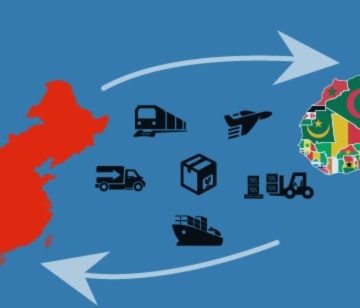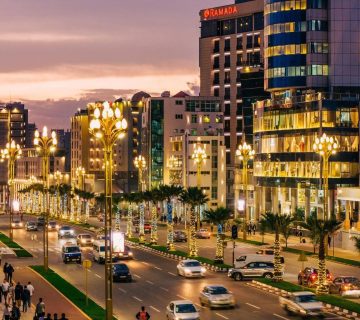In 2014, Somalia lodged a contentious case at the International Court of Justice (ICJ), seeking a judicial mechanism of delimiting the complete course of its maritime boundary with Kenya. Although Kenya raised objections as to the jurisdiction of the court over the matter, the court in 2017, admitted the case, which is still sub judice.
The disputed triangle of territory in the Indian Ocean, was created by overlapping claims by the two countries. Kenya’s boundary is on a parallel of latitude (straight line principle), while Somalia’s claim runs horizontal (equidistance principle). However, as the judicial process remains on course for September 2019 main hearing, Somalia has been acting and behaving in contempt of the court and in ways ruinous to state relations with Kenya.
Auction of Gas and Oil Blocks in the Zone at Issue
On February 7, 2019, Somalia put on auction gas and oil blocks in the disputed zone – the maritime zone strongly claimed by Kenya, at a London oil and gas conference. Strong diplomatic protest by Kenya and denial of such auction by Somalia notwithstanding, a document referred to as Offshore Somalia 2019, leaked from Somalia’s Ministry of Petroleum and Mineral Resources, indicate active bidding for 15 oil and gas blocs, put up by the Somali government.
The respective gas and oil blocks are blocks 131, 142, 152, and 153 located in Galmudug and referred to as Obbia Basin; blocks 164, 165, 166, 177, 178, and 179 in Hirshabelle and referred to as the Coriole Basin; and blocks 189, 190, 204, 218, and 219 in the Lamu Basin, which is Kenya’s maritime territory.
Further, the controversial document details a plan, with January 1, 2020, as the date when the successful bidder will start the exploration. Separate policy moves by Mogadishu, indicate a plan, known as the Production Sharing Agreement (PSA), to determine oil revenue sharing between the Federal Government of the Republic of Somalia and the Regional Member States. The PSA is slated for publishing in September 2019, around the same time, that the ICJ will be hearing the maritime delimitation case.
Contempt of Court
Somalia’s efforts to auction oil blocks either in the disputed zone or Kenya’s maritime territory in the Lamu Basin, undermines a long-held jurisprudential tradition and rule of sub judice. This rule disallows parties to a case seized by the court, from public actions and statements, made of prejudgment and likely to create an undue influence on the integrity of the court and its proceedings. The intended publication of PSA in September 2019, official exploration schedules ticking off from January 2020, and the listing of blocks 189, 190, 204, 218, and 219 in the Lamu Basin for auction, are sure proof of contempt of court and an obvious case of prejudgment, on the part of Somalia.
Kenya on the other hand, while protesting against Somalia’s provocations and infractions, reassured its submission to the court’s jurisdiction and has refrained from any dealings which would be held in contempt of the court.
Injury to Interstate Relations
Somalia’s attempts to auction gas and oil blocks in the disputed maritime zone, continue to prove provocative to Kenya, which emphasizes respect for the court process. The consequence of such provocations and transgressions, has been the boiling diplomatic tensions between the two neighboring states. In February 2019, Kenya expelled the Somali ambassador to Nairobi and recalled its ambassador to Mogadishu as protest against Somalia’s actions. Even as diplomatic relations between the two countries were restored in a month, tensions still linger on.
In May 2019, several Somali delegates were denied entry into Nairobi for non-observance of migration laws, and a number of Somali financial remittance companies (Hawala) shut down by Kenya. Somalia responded by banning its government officials from attending summits in Nairobi, and non-governmental organizations working in Somalia, from operating from Nairobi or risk deregistration.
It is also alleged that some foreign companies or entities are behind the escalation of the maritime dispute between Kenya and Somalia, by virtue of their interests in the gas and oil blocks up for auction by Somalia. It is likely for relations between Kenya and the mother countries of the gas and oil companies bidding for Kenya’s oil and gas blocks through Mogadishu, to deteriorate, as the matter is so crucial to Kenya’s national security. For instance, the disputed zone constitutes 26 per cent of Kenya Exclusive Economic Zone and 85 per cent of Kenya’s Continental Shelf beyond 200 nautical miles, aside from other security and defence dynamics ascribed to the matter.
The contentious case at the ICJ involving Kenya and Somalia is by nature adversarial, hence Somalia’s contempt of court, further aggravates relations between the two countries. Political and diplomatic fights between Mogadishu and Nairobi, further jeopardize good neighborliness espoused in both countries’ foreign policies. However, the indispensable national interest around the territory, minerals, and national defence and security, goads both countries to positional extremes, which might further undermine mutual interests, threaten interknit histories and trans-border realities shared between the two countries. Restraint should be exercised by both countries as regards actions that might be in contempt of court or provocative to each other. At best, in the greater interest of cooperation, peaceful and mutual interests between Kenya and Somalia, the two countries should explore alternative settlement mechanisms to the court process. Such alternatives will cement mutual trust and guarantee a future of mutually beneficial relations due to possibly win-win outcomes.
Edmond Pamba is a Research Assistant at the HORN Institute.



